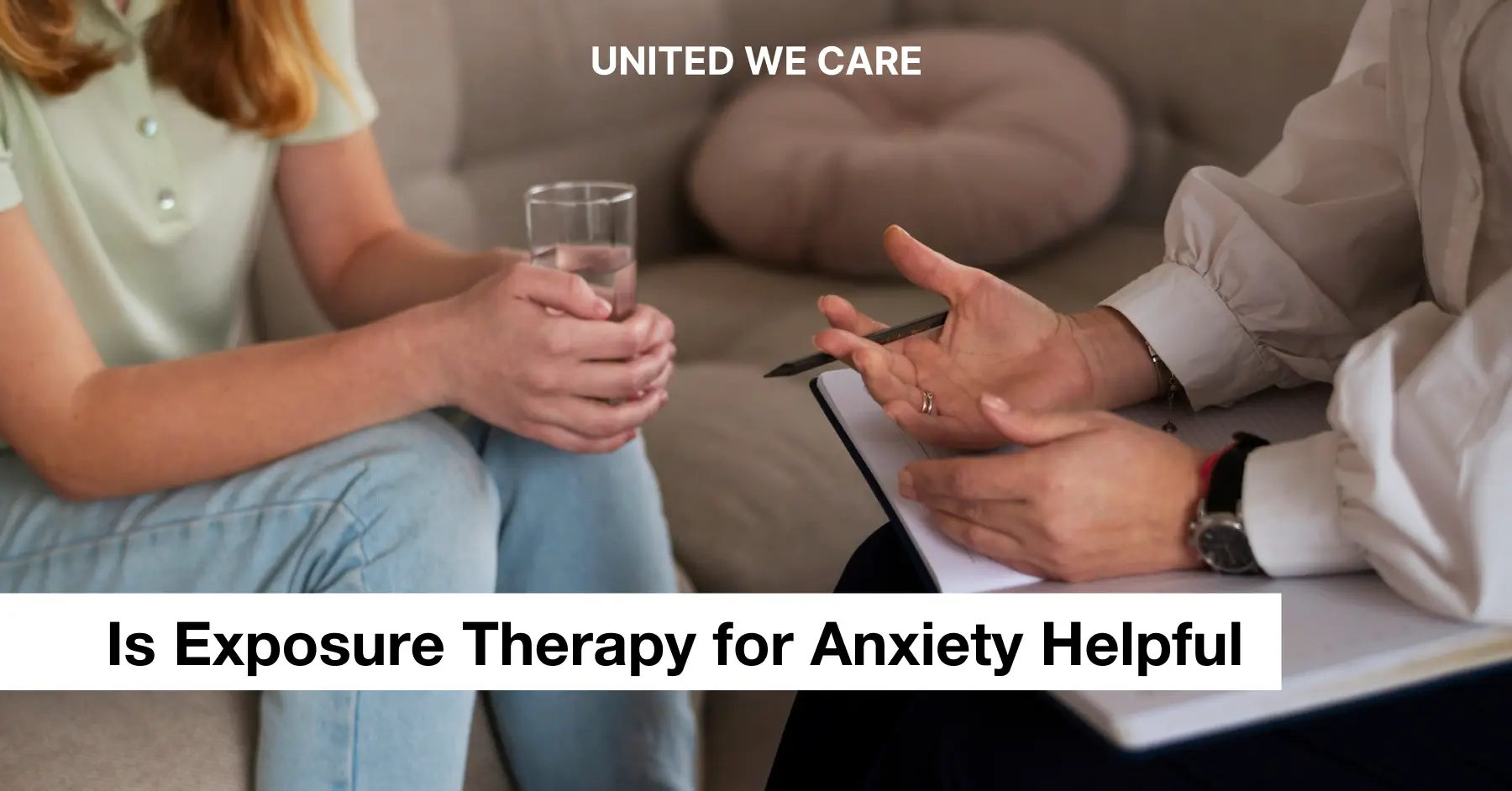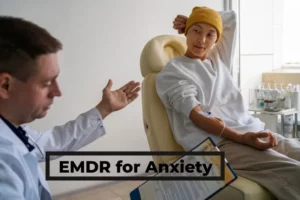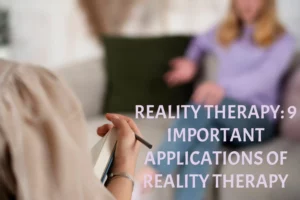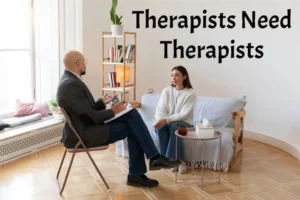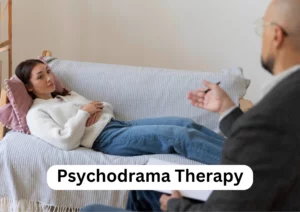Introduction
Nearly 30% of adults globally are affected by anxiety disorders at some point in their lives. [1] From the kind of society we live into our genetic predisposition to the lifestyle choices we make consciously or unconsciously, every aspect can contribute greatly to overwhelming stress and anxiety. Anxiety disorders are treatable, and exposure therapy for anxiety is an effective treatment option.
While fear is a natural emotional response to an immediate threat, what makes anxiety a concern is that the fear is in anticipation of a future concern and is often out of proportion. This can hinder one’s ability to function normally as they may start to avoid situations that can trigger their anxiety.
There are many different kinds of anxiety disorders, such as panic disorders, phobias, social anxiety disorders, etc. Based on the anxiety disorder and its severity, a combination of therapy and medication is used for effective treatment. In this blog, we’ll focus on exposure therapy for the treatment of anxiety, how it works, and its efficacy.
What is exposure therapy for anxiety?
Overwhelming anxiety can make you feel dreadful, hypervigilant, unfocused, and irritable mentally, and tremors, sweating, tense, and nauseous physically. Hence, feeling so anxious regarding a thing, activity, or situation can make you want to avoid dealing with or engaging with it. This is known as avoidance behavior.
Avoidance behavior may give you a feeling of reduced fear in the short term, but in the long term, it can increase your fear significantly since you have not processed it fully.
Exposure therapy for anxiety is designed in a way that you can face your fears in a safe and clinically controlled environment, which can help reduce your fear and avoidance.
Types of exposure therapy
There are different types of exposure therapy: [2]
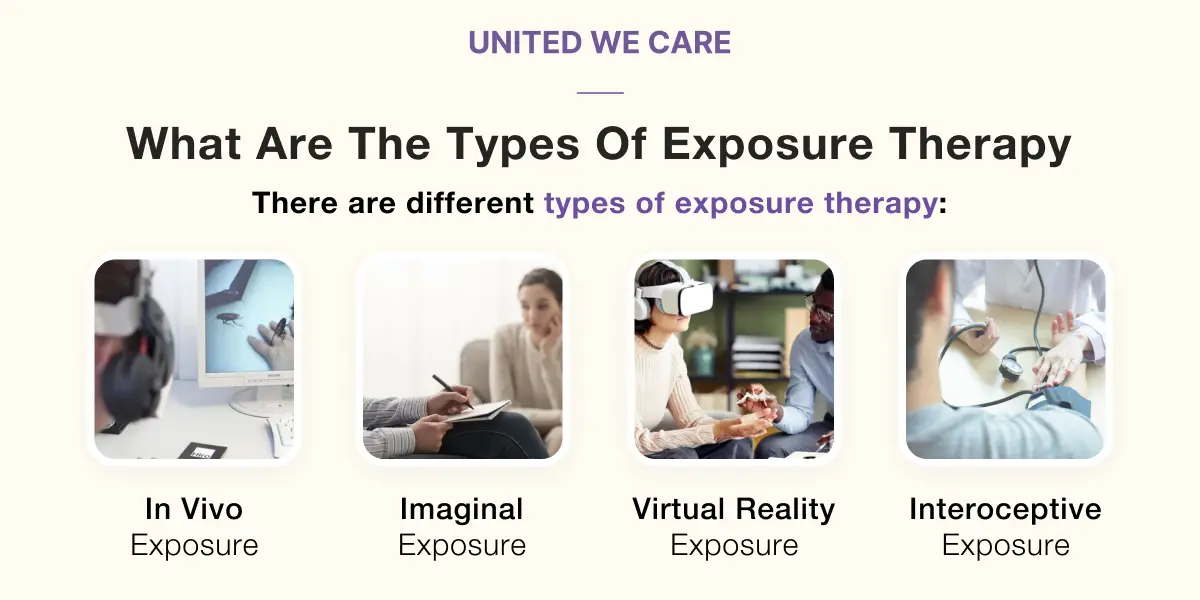
- In vivo exposure: In this kind of exposure, your therapist will make you face your feared object or situation in real life directly. For example, if an individual is afraid of spiders, they will be instructed to handle a spider.
- Imaginal exposure: This exposure works on a vivid imagination. Your therapist will ask you to imagine your feared object or situation. For instance, someone who is afraid of public speaking will imagine giving a speech in front of an audience.
- Virtual reality exposure: When in vivo exposure is not practical or available, virtual technology is used to create a simulation where you can experience your fears. For example, if someone is claustrophobic, they may take a virtual tour of a cave or tunnel sitting in their therapist’s office, as the VR provides them with the sights and sounds of an enclosed space.
- Interoceptive exposure: Your therapist will expose you to harmless physical sensations that you fear. For instance, if someone is afraid of having their heart rate speed up and have a panic attack, they may be asked to run around to increase their heart rate and learn that this sensation isn’t dangerous.
Paces of exposure therapy
- Graded exposure: A hierarchy of feared objects or situations is created based on their difficulty, and you will be exposed to them from mild difficulty to greater difficulty.
- Flooding: You will be exposed to your fear at maximum intensity for as long a period of time as it takes for your brain and body to calm down.
- Systematic desensitization: Exposure to feared objects or situations is combined with relaxation techniques to make the anxiety more manageable.
How does exposure therapy work for anxiety?
Exposure therapy works on the following principles: [3]
- Habituation: If you are repeatedly exposed to a feared object or situation, your fear of it decreases over time.
- Extinction: When you fear something, you have a negative association with it. Exposure therapy can help weaken and unlearn this negative association.
- Emotional processing: You will learn to create new and more realistic beliefs about your feared objects or situations.
- Self-efficacy: Exposure therapy encourages you to and reaffirms your ability to deal with your fears and manage your feelings of anxiety.
The therapist will determine your case of fear of anxiety and then decide which type and pace of exposure therapy is best suited for you.
Is exposure therapy for anxiety helpful?
Most recent studies deem exposure therapy a gold standard treatment for phobias, panic disorders, social anxiety disorder, generalized anxiety disorder, obsessive-compulsive disorder (OCD), and post-traumatic stress disorder (PTSD). [3]
In 2023, a study evaluated the effects of imaginal exposure vs. self-monitoring for treating 82 participants with social anxiety disorder (SAD) via. a smartphone application. Researchers found that those using imaginal exposure and those who completed more exercises experienced significantly greater reductions in social anxiety and an increase in self-efficacy post-treatment. [5]
A 2020 study explored the efficacy of Virtual Reality Exposure Therapy (VRET) for treating SAD. A clinical review of 22 studies with a total of 703 participants found at least three sessions of VRET to be significantly effective long-term, measured at various follow-up intervals. [4]
A 2019 study investigated the effects of interoceptive exposure for panic disorder using a standardized hyperventilation procedure on 48 participants with high and low anxiety sensitivity. After two sessions of guided hyperventilation and normoventilation, results showed reduced defensive mobilization with repeated exposure, rendering interoceptive exposure effective in reducing anxiety sensitivity and symptoms of panic disorder. [6]
How to do exposure therapy for anxiety
It is best to consult a professional healthcare provider who will create the right treatment plan for you. If your doctor or therapist suggests self-help strategies, you may learn to create awareness around your fear and triggers. You can also learn and try relaxation strategies, such as deep breathing when you are exposed to your feared stimulus, to reduce your anxiety and reaction to it. Sharing your experiences with a close one for support can help as well.
Conclusion
Anxiety disorders can be debilitating as overwhelming fear can result in avoidance behaviors, which can hinder daily functioning. Exposure therapy is effective in the treatment of anxiety disorders. If you or someone you know has overwhelming anxiety, consider seeking professional help. Book a session with one of our mental health experts at United We Care, who can help you develop healthier coping strategies for your fears.
References:
[1] American Psychiatric Association, “What Are Anxiety Disorders?” [Online]. Available: https://www.psychiatry.org/patients-families/anxiety-disorders/what-are-anxiety-disorders#. Accessed: Dec. 15, 2023.
[2] David C.S. Richard, Dean Lauterbach, Handbook of Exposure Therapies. [Online]. Available: https://books.google.co.in/books?id=Not67GqAnOYC. Accessed: Dec. 15, 2023.
[3] American Psychological Association, “Exposure Therapy for PTSD.” [Online]. Available: https://www.apa.org/ptsd-guideline/patients-and-families/exposure-therapy. Accessed: Dec. 15, 2023.
[4] T. Horigome, S. Kurokawa, K. Sawada, S. Kudo, K. Shiga, M. Mimura, and T. Kishimoto, “Virtual reality exposure therapy for social anxiety disorder: a systematic review and meta-analysis,” Psychological Medicine, vol. 50, no. 15, pp. 2487–2497, 2020. [Online]. Available: https://www.cambridge.org/core/journals/psychological-medicine/article/abs/virtual-reality-exposure-therapy-for-social-anxiety-disorder-a-systematic-review-and-metaanalysis/04F84DD9C217D582E03D0638E2E65FAE. Accessed: Dec. 15, 2023.
[5] J. T. Schwob and M. G. Newman, “Brief imaginal exposure exercises for social anxiety disorder: A randomized controlled trial of a self-help momentary intervention app,” Journal of Anxiety Disorders, vol. 98, 102749, 2023. [Online]. Available: https://doi.org/10.1016/j.janxdis.2023.102749. Accessed: Dec. 15, 2023.
[6] K. Holtz, A. O. Hamm, and C. A. Pané-Farré, “Repeated Interoceptive Exposure in Individuals With High and Low Anxiety Sensitivity,” Behavior Modification, vol. 43, no. 4, pp. 467-489, 2019. [Online]. Available: https://doi.org/10.1177/0145445518772269. Accessed: Dec. 15, 2023.

